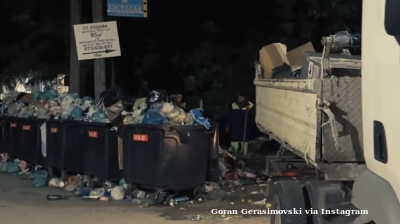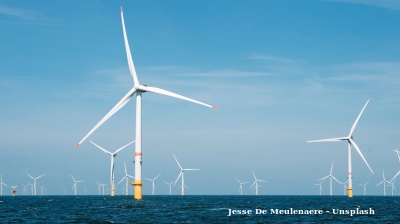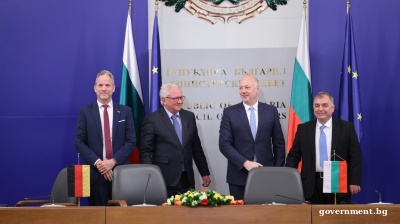A total of 19 European governments have accelerated their decarbonisation policies in response to a combination of the coronavirus (COVID-19) pandemic, the gas crisis and Russia’s invasion of Ukraine.
At stake is both the future of the climate and the security of Europe, with reducing its dependence on fossil fuels crucial to ensuring the continent’s future geopolitical and economic security.
Two green think-thanks, CREA and Ember, said in a recent report that the majority of European countries have become more ambitious in terms of their renewable energy deployment since 2019, while also reducing their planned fossil fuel generation until 2030 in a bid to shield themselves from geopolitical threats to their energy security.
The report found that taken together, EU member states had now published plans to reach a 63% share of renewables in electricity generation by 2030, up from 55% under previous commitments.
Meanwhile, EU countries had cut planned 2030 fossil fuel power generation by 31% (272 TWh) compared to national strategies, known as NECPs, that had been published until 2019.
The report concluded that Russia’s invasion of Ukraine was the key motive for increased commitments to phase out fossil fuels and accelerate decarbonisation, especially for the EU’s largest importers of Russian fossil fuels – Germany, Italy and the Netherlands.
The electricity transition is not solely an issue of climate concerns, but also one of ensuring stable supplies of energy for European households and businesses.
Planned fossil fuel generation for 2030 now totals 595 TWh, a steep 31% drop from the previous projections for 867 TWh.
Latest government policies show an expected 63% share of electricity from renewables in 2030, up from 55% under the previous national strategies that were published in 2019.
The EU’s REPowerEU programme, which aims to end the EU's dependence on Russian fossil fuels at a cost of €300bn investment in renewables and sustainability, will raise this percentage increase to 69% by 2030.
Turbochage
Pawel Czyzak, senior energy & climate data at Ember, said: “The EU has put the energy transition on turbocharge, with governments getting serious about cutting out costly fossil fuels. There’s a consensus that ramping up wind and solar power quicker can help the EU head off multiple crises.”
The report said that Germany, the largest importer of fossil fuels from Russia, is increasing its planned share of renewable electricity to 80% by 2030, up from 62% by 2030 under previous commitments.
Together with the Netherlands, Denmark and Belgium, the country also plans to build 150 GW of offshore wind by 2050.
Another top Russian fossil fuel importer, Italy, increased its planned share of renewables electricity from 60 to 70% by 2030.
Erika Uusivuori, an analyst at the Centre for Research on Energy and Clean Air (CREA), said that “Europe now recognises that fossil fuels equal volatility. The current energy landscape is unprecedented, but a jump in ambition to cut fossil fuel dependence is now putting countries on a path to more security.”

Country by country
The report highlighted that by 2030 four countries would now generate close to all of their electricity from renewables: Portugal, the Netherlands, Austria and Denmark.
A new 80% renewables target puts Germany close behind, while Italy, Ireland and Greece have all increased their ambition up to a 70% share of renewables in electricity production.
Most EU member states are now aiming for above 50% RES by 2030 and ambition is likely to grow further: the recently announced European Commission strategy REPowerEU targets 69% of electricity from renewables by 2030.
Between 2020 and 2022 several countries – Bulgaria, Croatia, Czechia, Poland, Romania and Slovenia – officially announced coal phase-out dates, and Germany accelerated its target date from 2038 to 2030.
Coal may have experienced temporary generation increases since mid-2021 due to skyrocketing gas costs, but its own extremely high price is now also contributing to increased consumer tariffs in countries such as Poland.
A hesitant rethink of planned gas investments is also starting to simmer in both Poland and Belgium, the two countries that had planned the largest gas expansion under their 2019 NECPs. Gas is also driving high electricity prices in countries like Spain and Italy, who are accelerating RES deployment to cope with the economic impacts of fossil fuel dependence.

European alternatives
In Germany, since the invasion of Ukraine, Germany’s Economic Minister Habeck has emphasised the importance of phasing out fossil fuels and has announced higher ambitions in renewable energy. Germany is accelerating its clean energy plan by increasing the share of renewable energy from 65% to 80% by 2030. This will include additions of 110 GW of onshore wind by 2030 up from 54.4 GW in 2021, 30 GW of offshore wind by 2030 and a further 70 GW by 2045 up from 7.7 GW installed capacity today, and 200 GW of solar PV by 2030 up from 53.8 GW in 2021.
The Netherlands has unveiled plans to double the country’s production of offshore wind capacity to 21 GW by 2030. If the plans go through, wind energy would be the largest source of electricity by 2030. The intention is to use this electricity for industry and households. The country has ambitious plans for all of its energy supplies to come from renewables by 2050, and is maintaining its decision to stop production at Europe’s largest onshore natural gas field by the end of 2022.
Looking ahead, the report warned that much still needed to be done and agreed to meet these targets.
Increased targets are undoubtedly needed, but to successfully decouple from fossil fuels, EU member states will need to anticipate the next set of challenges – the first one being the approval of the REPowerEU package by all Member States.
This is critical for Europe’s security: it will provide a framework for country-level policy advancements and help coordinate efforts to reduce exposure to fossil fuels.
Ensuring the delivery of the announced policies will not be easy, and the required scale of renewables deployment is unprecedented.
The report noted that some headway was being made. REpowerEU including a recommendation on permitting, a Solar Strategy, and guidance for power purchase agreements (PPA). However, the successful adoption of these measures will depend on all Member States, who need to deliver on their declarations.
Countries like Poland, still hanging on to a planned 67% fossil fuel share in electricity generation in 2030, need to align with the joint effort to ensure their own security.
Investment
The key issue is funding, said the report. REpowerEU entails an additional investment of €210bn until 2027 and possibly €300bn by 2030 on top of what is necessary to reach Fit for 55 goals.
However, the report is confident that the changes will save up to €100bn per year in fossil fuel imports by 2030 (€80bn in gas, €12bn in oil and €1.7bn in coal).
REpowerEU will also double the funding to decarbonise industry through innovative technology to €3bn.
Other issues to be address include improved policies on oil. The report warned that the oil sector has still not seen direct country-level measures to reduce demand in the short run, which could help countries avoid a crunch with the ban on Russian oil included in the EU’s sixth package of sanctions on Russia.
REPowerEU proposals targeting industry, such as hydrogen uptake, fuel substitution and energy efficiency, are expected to lead to a marginal decline in oil demand. A vote by the Environment Committee of the European Parliament to ban the sale of internal combustion engines in the EU by 2035 should help accelerate the uptake of electric vehicles and drive down oil consumption, but more ambitious short-term actions are needed to reduce oil demand.
The report was clear in stressing that climate risk is now also a security risk for Europe and that the only way forward is to reduce fossil fuel consumption. The security of the European continent, which is now being tested in Ukraine, can only be ensured through phasing out fossil fuels.
bneGREEN

The Arctic and Antarctica record "off the charts" heat as polar warming accelerates
Parts of both the Arctic and Antarctic have experienced historically high temperatures in recent weeks, with weather stations in East Antarctica recording record-breaking warmth for the month of October, alarming climate scientists.

Giant glacier chunk breaks away in Tajikistan, mountain villages put on alert
Situation serves as reminder that climate crisis threatens to wreak havoc in Central Asian country.

Singapore’s green pivot – headline grabbing but still limited
Forays into offshore wind via regional cooperation with neighbours, and forward-looking bets on hydrogen and low-carbon fuels are making headlines, but the scale required to wean a heavily gas-dependent system off fossil fuels is still daunting.

North Macedonia's Skopje tackles mounting waste and rodent crisis
Locals say the problems in Skopje's Centar municipality worsened during the local election period when political campaigning took precedence over maintenance.




